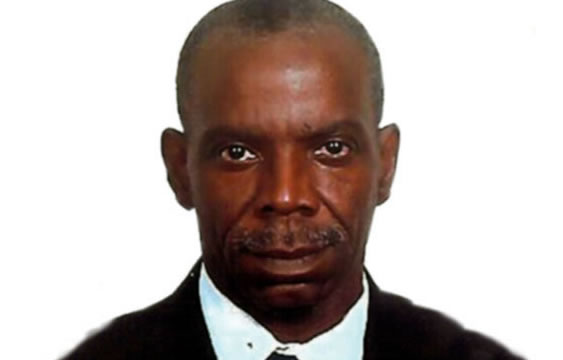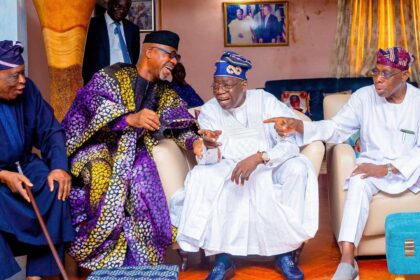[ad_1]

Two individuals, who are probably unknown to each other, but with more than passing interest, called after reading this column last week on the audacious call by some for a coup d’état and the lesser evil of Interim Government.
Each caller thought the intervention should have leaned towards his “The right” position. Asked why he thought the column was “nonsense,” one of them retorted, with a whiff of “vawulence,” “So we can’t fight for our right again?”
Calling for a coup d’état or Interim Government reminds one of Nobel laureate, Prof. Wole Soyinka’s observation that some Nigerians cannot “entertain corrective criticism.”
Former President Olusegun Obasanjo observes: “Given what we saw during the (recent general elections), Nigeria is now even more divided and more corroded than we thought.” Campaign rhetoric was divisive; voting, compromised; and the result, split, with the top three contestants winning 12 states apiece.
Spewing “facts,” including outright lies, to support their narratives, suggests a propaganda machine on a dangerous overdrive. This is the age of Artificial Intelligence, where “facts” or data can be “fabricated” to support predetermined positions.
Accountants may force-balance an account by supplying figures to supplement math that doesn’t quite add up. This raises the concern of novelist Chimamanda Adichie about the danger of telling a single story.
Trying to win willy nilly reminds one of America’s military tradition that sometimes requires that all enemy soldiers sighted must be killed; none taken as prisoners. This attitude may have developed from America’s tradition of settling scores with gun duels that must end in the death of one of the duelers. There are no in-betweens.
The English declare total war when they swear that they will take no quarter; that no enemy soldiers will be treated with kindness or taken prisoner. All enemies will be killed. When they raise the red flag, that means total war without any mercy. When they raise a black flag, they could spare enemy soldiers who surrender early enough.
In 1644, during the English Civil War, the English Parliament issued an “Ordinance of No Quarter” against the Irish Confederacy that wanted to send troops to support Charles I, King of England, Scotland and Ireland, who was eventually executed in 1649.
The ordinance read, in part: “An Ordinance Commanding that no Officer or Soldier (of the English army), either by Sea or Land, shall give any Quarter (or mercy) to any Irishman, or papist (for Catholics) born in Ireland, which shall be taken in Arms against the Parliament in England.”
This kill or be killed military credo appears to have seeped into Nigeria’s political culture with the recently concluded 2023 general elections, as it exhibits the vilest of this morbid doctrine, with no room for negotiations or compromises.
The space for violence is now open and Simon Ekpa of Indigenous People of Biafra, which had hitherto restricted its activities to the South-East, wants to migrate his activities to Lagos State, the biggest economy in Nigeria.
He called for the Biafra-style sit-at-home every Monday in Lagos, with intent at “crippling the economy of Lagos State Government (sic),” that he alleges is “directly responsible for the attack against the Igbo (in Lagos State).” Here’s hoping that the Oodua People’s Congress won’t take this as an affront.
To be sure, no one who rigs any of the elections held in 2023, should get away with it. And the Independent National Electoral Commission, the umpire of the elections, must be sanctioned if found culpable.
Any INEC employee who broke the electoral law must be sanctioned too. Also, politicians, who compromised INEC staff, bought votes or instigated violence at the polls should be caught and their victory declared pyrrhic, null and void.
Nigeria has adopted democratic values, written an (albeit) imperfect Constitution, and enacted an Electoral Act, which is periodically reviewed, to conduct its elections according to agreed rules, regulations and conventions.
There is a high degree of intolerance, even in non-contentious conversations these days. You get the impression that even your closest friends are looking out for any slips and will slam you at the slightest hint of deviation from their personal views.
It is increasingly looking as if the campaigns are not yet over, even though the elections have been concluded. Intelligent people are descending into unacceptable levels of intellectual lows just to win an argument.
The mischievous ones, including a Senior Advocate of Nigeria, go about insisting that you must win the Federal Capital Territory before you can win the presidential election, even if you have the highest votes and 25 per cent of votes in two-thirds of the states in the federation.
Datti Baba-Ahmed, running mate to Peter Obi, presidential candidate of the Labour Party, that is still managing post-election funk, thinks that, though Bola Tinubu won the highest votes and more than 25 per cent of votes in 30 states, he can’t be President because he didn’t win 25 per cent of votes in the Federal Capital Territory.
In his usual non-contentious manner, Obi says, “I am not challenging the outcome (of the election). I am challenging the process (by) which they arrived at their (result).”
Prof Soyinka is probably concerned that Baba-Ahmed is threatening that the Supreme Court of Nigeria better adopt his interpretation of the Constitution, and thinks such an attitude attempts to browbeat the judiciary and may “undermine the structure of justice.”
The pro-Tinubu group has mined out data to show that its candidate won despite the low turnout of voters. If the argument is about calls for coup d’état and Interim Government, they needn’t worry. The Constitution supports neither.
Section 66 of the Electoral Act says the candidate with the highest number of votes cast, subject to Sections 133, 134 and 179 of the Nigerian Constitution, shall be declared as the winner.
Section 134(2), which is the most relevant here, provides that, “A candidate for an election to the office of President shall be deemed to have been duly elected where, there being more than two candidates for the election:
“He has the highest number of votes cast in the election; and he has not less than one-quarter of the votes cast in at least two-thirds of all the States of the Federation and the Federal Capital Territory, Abuja.” The Supreme Court should soon tell if the FCT has a veto vote over states.
You get the impression that some Nigerians hope that continued expression of negative sentiment against the outcome of the elections, which albeit is not exactly perfect, will cause an annulment, another election, coup d’état or Interim Government.
Two prominent politicians, one of whom was a permanent secretary and state governor, insist that Tinubu will not be sworn-in as President. Such highly visible individuals need to watch their utterances. Democracy does not imply that everyone must agree.
This raucous posture shouldn’t be 2.0 of the Association for Better Nigeria that scuttled MKO Abiola’s June 12, 1993 presidential victory and put Nigeria in a tailspin, a project wrought by Senator Arthur Nzeribe, an Igbo, who once wrote an op-ed against any Yoruba being President of Nigeria.
While you must commend the principled stand of concerned Nigerians on the credibility of the electoral process, the idea of coup d’état or Interim Government won’t cut the ice.
[ad_2]
Source link







